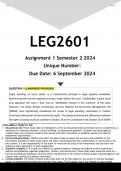LEG2601
Assignment 1 Semester 2 2024
Unique Number:
Due Date: 6 September 2024
QUESTION 1 (3 ANSWERS PROVIDED)
Legal standing, or locus standi, is a fundamental principle in legal systems worldwide,
determining who has the capacity to bring a matter before the court. Traditionally, a party could
only approach the court if they had an "identifiable interest in the outcome" of the case.
However, the South African Constitution and the National Environmental Management Act
(NEMA) have significantly broadened the scope of legal standing, particularly in matters
involving fundamental and environmental rights. This essay examines the differences between
the right to access courts as outlined in Section 38 of the Constitution and Section 32 of NEMA
and explores the importance of broadening legal standing in environmental issues.
DISCLAIMER & TERMS OF USE
1. Educational Aid: These study notes are designed to serve as educational aids and should not be considered as a
substitute for individual research, critical thinking, or professional guidance. Students are encouraged to
conduct their own extensive research and consult with their instructors or academic advisors for specific
assignment requirements.
2. Personal Responsibility: While every effort has been made to ensure the accuracy and reliability of the
information provided in these study notes, the seller cannot guarantee the completeness or correctness of all
the content. It is the responsibility of the buyer to verify the accuracy of the information and use their own
judgment when applying it to their assignments.
3. Academic Integrity: It is crucial for students to uphold academic integrity and adhere to their institution's
policies and guidelines regarding plagiarism, citation, and referencing. These study notes should be used as a
tool for learning and inspiration, but any direct reproduction of the content without proper acknowledgment and
citation may constitute academic misconduct.
4. Limited Liability: The seller of these study notes shall not be held liable for any direct or indirect damages,
losses, or consequences arising from the use of the notes. This includes, but is not limited to, poor grades,
academic penalties, or any other negative outcomes resulting from the application or misuse of the information
provided. ]




